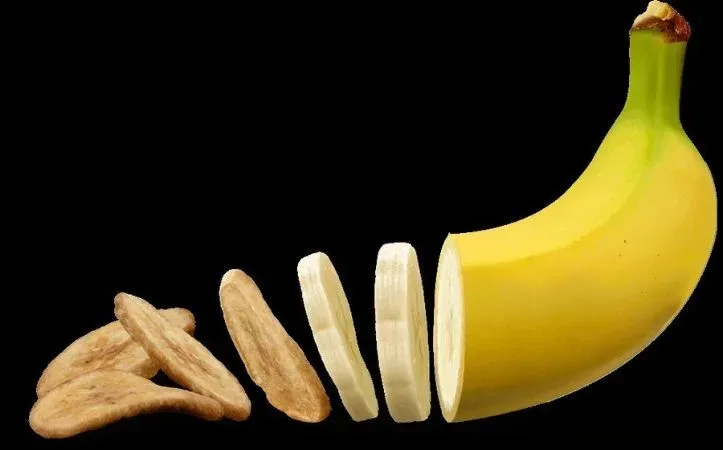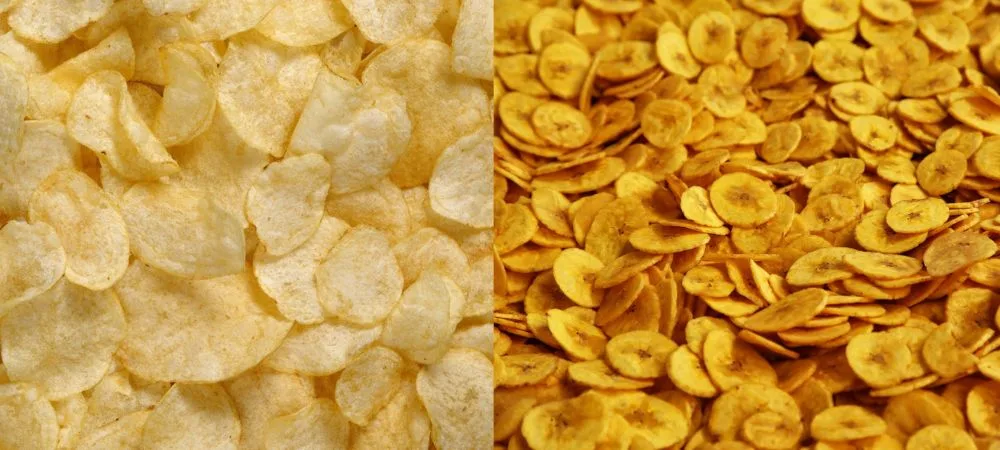Table of Contents
ToggleBanana Chips vs Potato Chips: Which is the Healthier Choice?
Banana chips and potato chips are two competitors that frequently steal the show in the world of munching. The decision between these two popular treats becomes problematic as we negotiate the ever increasing world of healthy eating. Are kerala banana chips really a better choice than traditional potato chips? Let us examine the nutritional details of both choices to find out which one wins the battle of the chips.
The contrast between these crunchy treats is not just about taste, but also about choosing decisions that are best for our health. With their possible health advantages, banana chips are challenging the long-reigning champion of favorite pleasure, potato chips. We will examine their nutrient profiles to find out if banana chips indeed beat out traditional potato chips as a healthier snack alternative.
Understanding Banana Chips and Potato Chips
Banana chips and potato chips are two competitors in the realm of snacking that have won the hearts (and palates) of many. These crunchy snacks compete favorably in the snacking market thanks to their variety of tastes and textures.
A popular snack in tropical areas like Kerala, banana chips are made from ripe bananas that are finely sliced and then crisp-fried. As a result, they have a pleasing crunch and are a delectable combination of sweet and salty. A variety of spices are frequently used to season these chips, giving the experience an additional degree of flavor richness.
On the other hand, potato chips are a global phenomenon. They are similarly fried and made with thinly sliced potatoes, giving them the coveted crispness that many people enjoy. Potato chips come in a wide variety of tastes, from the traditional salted to daring blends like barbeque or sour cream and onion.
Determining which of these foods is healthiest requires an understanding of their unique characteristics. While both provide a decadent experience, it is important to take into account aspects like preparation techniques, nutritional value, and portion proportions. Making an informed decision guarantees that your snacking journey will coincide with your health goals and taste preferences, whether you are pulled to the classic attraction of potato chips or the tropical seduction of banana chips.
Nutritional Comparison
Calories and Fat Content
Banana chips and potato chips differ from one another in terms of calories and fat content. Banana chips frequently have a modest advantage over their potato competitors in this aspect. Bananas’ inherent sweetness gives banana chips a natural flavor that reduces the need for excessive amounts of additional oil during the frying process. However, both snack choices still contain a significant amount of calories because they are cooked by frying. Remember to appreciate these crunchy treats slowly and think about the little nutritional differences they offer as you gorge.
Carbohydrates and Fiber
The amount of carbohydrates and fiber in Banana Chips and Potato Chips differs significantly when comparing their nutritional profiles. Kerala banana chips, which are made from ripe bananas, typically contain more carbohydrates than their potato equivalents. Banana chips contain dietary fiber, which comes from the natural qualities of bananas and is essential for promoting digestion and extending the feeling of fullness. On the other hand, potato chips often have less fiber. This differential in dietary fiber has an effect on our digestive health as well as how these snacks affect satiety.
Vitamins and Minerals
Banana chips are unquestionably the nutritional champions when it comes to vitamins and minerals. The main component of banana chips, bananas, are well known for having a high potassium content. Potassium is a crucial mineral that promotes heart health and electrolyte balance. They also include significant amounts of vitamin C, which supports the immune system, and vitamin B6, which supports cognition and metabolism. However, even while potatoes can contain vitamins, such as vitamin C, the frying procedure used to make potato chips can lead to a certain amount of nutrient loss. Thus, Kerala banana chips come out on top as a more nutrient-rich and health-conscious snacking option when taking into account the variety of vitamins and minerals.
Sodium Content
Both banana chips and potato chips, if they are strongly seasoned, can shift the salt balance. When ingested in excess, sodium, a necessary nutrient, causes problems. Consuming too much sodium raises the risk of heart disease and is connected to high blood pressure. It is important to read the nutrition labels for correct information even though the precise sodium levels vary depending on brands and preparation techniques.
Reduce this worry by selecting low-sodium or unsalted varieties of these snacks. Making the switch to homemade or lightly seasoned types can be a good choice for individuals managing their sodium intake.

Health Considerations
Glycemic Index
The glycemic index, a critical determinant in measuring the effect of foods on blood sugar levels, comes under the spotlight in the area of nutritional value. Here, the distinction between potato chips and banana chips is more obvious. Comparing Kerala banana chips to potato chips, the latter had a lower glycemic index. This indicates that banana chips are a better choice for people trying to control their blood sugar levels since they result in a slower and more gradual rise in blood sugar levels after eating. Kerala banana chips are enticing as a healthier snack option because of this distinctive quality, which adds still another dimension of appeal.
Acrylamide Formation
The probable development of acrylamide, a substance that occurs during high-temperature cooking operations, is one issue related to potato chips. It is thought that acrylamide has cancer-causing characteristics. Both bananas and potato chips can create acrylamide, although the amount formed depends on the cooking process and time.
It is important to understand that both potato chips and banana chips have the potential to contain acrylamide. However, the degree of its presence is dependent on variables like the frying oil type and the cooking temperature. Contrary to popular belief, kerala banana chips are frequently made using coconut oil at lower temperatures, which may lead to less acrylamide generation than the high-heat frying techniques used to make potato chips.
Trans Fats and Saturated Fats
The amount of saturated and trans fats is a major factor when it comes to nutritional content. Both banana chips and potato chips have the characteristic of frequently being fried, which results in the addition of these bad fats. Making a healthier decision, though, involves choosing chips made with better frying oils and less chemicals. By choosing chips made with healthier oils, you can drastically lower your intake of saturated and trans fats, improving your health in general.
Taste and Texture
Cooking Methods and Oil Usage
The taste and texture of both bananas and potato chips are significantly influenced by the cooking techniques and oil used. Banana chips are frequently fried in coconut oil, a common ingredient in Keralan cuisine, which brings out their unique flavor and adds a dash of authenticity. On the other hand, potato chips are frequently cooked in different kinds of vegetable oils, which results in a distinctive flavor profile. The oil selection influences the chips’ overall healthiness in addition to how they taste. As you enjoy these crunchy treats, keep in mind that the type of oil used influences the distinctive characteristics of each chip variation.
Portion Control and Moderation
One aspect remains crucial as we compare the nutritional differences between banana chips and potato chips: portion control. Despite the fact that they have different nutritional profiles, both of these snacks, when consumed in moderation, can add to a balanced diet. The key to enjoying the tastes of Thai banana chips or traditional potato chips without tipping the scales toward overindulgence is to embrace portion control. Keep in mind that it is important to consider both what and how much we eat. We can enjoy these crunchy treats guilt-free while maintaining a health-conscious approach to snacking by engaging in mindful portion control.
Conclusion
The winner of the contest between banana chips and potato chips will rely on your dietary habits and health objectives. Although banana chips have some nutritional advantages, such as more fiber and vitamins, potato chips remain a popular and pleasant snack. The secret to combining both snacks sensibly into your diet is choosing healthy cooking methods, paying attention to portion limits, and enjoying either flavor in moderation. Making wise decisions guarantees that your snacking experience will be in line with your well-being, whether you are looking for a flavor of nostalgia or a tropical twist.
FAQs
If you are minding your diet, banana chips may be a good option. In comparison to typical potato chips, they have a lower glycemic index and more fiber, which may help with blood sugar control. To avoid consuming too many calories, it is vital to take them in moderation.
Absolutely! The potassium found naturally in bananas is retained in banana chips. Potassium is essential for supporting muscular function, controlling blood pressure, and preserving heart health. A pleasant approach to add this healthy ingredient to your diet is by snacking on banana chips.
Certainly! It is extremely possible to make healthier versions of potato chips. Select potatoes that are thinly sliced, bake them with little oil, and season them with herbs or spices for flavor. Compared to conventional frying, this method considerably minimizes the amount of oil and fat, giving you a healthier homemade snack.
One ounce is about the right serving size for both bananas and potato chips. With this reasonable serving, you may indulge in the tastes and crunch of the chips without going over your calorie limit. Always remember that keeping a balanced diet requires portion control.
Certainly! When eaten in moderation, a range of snacks, including potato chips and bananas, are OK. Savoring these chips attentively and in moderation will help you to strike a balance between your sporadic desires and your overall health objectives. Just keep in mind that the key to overall wellbeing is to prioritize a varied and nutrient-rich diet.


